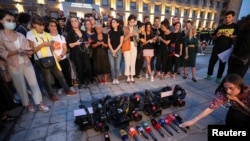Several thousand people protested Sunday evening in front of the Georgian parliament, demanding that the ex-Soviet nation's prime minister resign over the death of a journalist who was attacked and beaten by anti-LGBT protesters.
Cameraman Alexander Lashkarava was found dead in his home by his mother earlier Sunday, according to the TV Pirveli channel he worked for. Lashkarava was one of several dozen journalists attacked last Monday by opponents of an LGBT march that had been scheduled to take place that day in the Georgian capital of Tbilisi.
Organizers of the Tbilisi March for Dignity canceled the event, saying authorities had not provided adequate security guarantees. Opponents of the march blocked off the capital's main avenue, denounced journalists covering the protest as pro-LGBT propagandists and threw sticks and bottles at them.
Lashkarava, according to his colleague Miranda Baghaturia, was beaten by a mob of 20 people. Local TV channels later showed him with bruises on his face and blood on the floor around him. Media reports say he sustained multiple injuries and had to undergo surgery but was discharged Thursday from a hospital.
The cause of his death was not immediately clear.
Police launched an investigation into Lashkarava's death, which Georgia's Prime Minister Irakli Garibashvili and President Salome Zurabishvili both described as a tragedy.
Animosity against sexual minorities is strong in the conservative Black Sea nation of Georgia.
The Tbilisi Pride group said Monday that opponents of the planned march were supported by the government and by the Georgian Orthodox Church. The Open Caucasus Media group published a photo of a man it said was a local TV journalist being pulled away from the scene in a headlock by an Orthodox priest.
Zurabishvili condemned the violence, but Garibashvili alleged the march was organized by "radical opposition" forces that he said were led by exiled former President Mikheil Saakashvili.
A large crowd of protesters that gathered in Tbilisi on Sunday demanded that authorities punish those responsible for the attack on journalists and urged Garibashvili to step down. Some protesters blamed the prime minister for enabling the violence by publicly denouncing the LGBT march.




